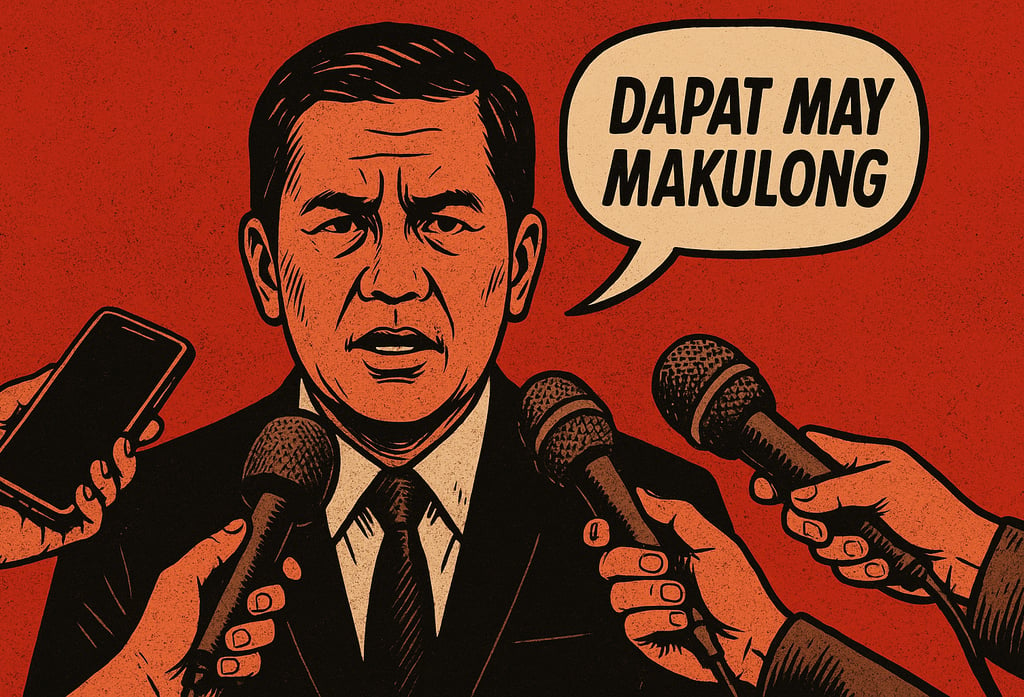“Dapat May Makulong”: A Country Wishing for Justice
The phrase “dapat may makulong” has turned from a call for justice into a daily reflex. This piece examines how even those in power now echo it, watching instead of acting. A look at what happens when accountability becomes a wish instead of a duty, a hope instead of an expectation.
7 min read


There’s a phrase you’ll hear almost every day now — from the driver stuck in traffic, the office worker scrolling through headlines, the parent shaking their head over breakfast: “Dapat may makulong.”
It sounds like a demand, but it isn’t. It’s a wish. A tired kind of hope that justice might still be possible in a country where the powerful rarely face it. It’s what we mutter while reading about yet another scandal involving familiar names, yet another investigation that will take years — if it even makes it past the headlines.
When people say “dapat may makulong” today, they’re not expecting anyone to actually end up behind bars. They’re expressing the small faith that maybe this time, someone will. That maybe justice isn’t entirely a myth. But deep down, everyone knows it’s more prayer than prediction — the modern version of lighting a candle for a miracle that never comes.
From Expectation to Wish
There was a time when “dapat may makulong” carried real weight — when people said it believing the law could still deliver justice. But over the years, that expectation slowly turned into a wish.
The phrase means “someone should be imprisoned.” Yet the way it’s said now reveals something else entirely: the erosion of trust in institutions meant to uphold the law. It’s no longer rooted in confidence that the system works. It’s what people say when they already know accountability is unlikely.
The words haven’t changed, but the meaning has. What used to be an assertion of justice has become a quiet expression of frustration — a reminder that in today’s Philippines, the law’s promise and its practice rarely meet.
The Laws That Look Good on Paper
The Philippines doesn’t lack laws. The 1987 Constitution already says public office is a public trust. Republic Act 3019 — the Anti-Graft and Corrupt Practices Act — lays out how to prosecute those who abuse it. There’s the Office of the Ombudsman, created to investigate and charge corrupt officials, and the Sandiganbayan, a court built specifically to handle those cases.
On paper, it all looks solid. These laws were designed to ensure that anyone who misuses public funds faces consequences. The problem isn’t the framework — it’s the distance between what the law promises and what it actually delivers.
Take the 14 engineers from local governments and the Department of Public Works and Highways who’ve been killed since 2023 — many of them linked to knowledge of infrastructure corruption. Investigations crawl while witnesses risk their lives just to name names. Some engineers even give sworn testimony exposing kickbacks worth billions, pointing directly at powerful figures. Months pass, and nothing meaningful happens.
Then there’s the 2025 flood control scandal. Senate probes uncovered over 400 ghost projects, padded contracts, and budget insertions designed to funnel public money to politicians and contractors. Witnesses described delivering suitcases of cash to senators, congressmen, and even former House speakers. The evidence is there. The witnesses have spoken. Yet the same people continue working, some even retiring comfortably on government pensions.
The law exists. What’s missing is enforcement.
The Officials Who Wish Alongside Us
What’s worse is that even the people in charge of enforcing the law sound like they’ve given up. The ones who should be demanding accountability are left hoping someone else will do it.
The Office of the Ombudsman barely has the funding to keep up with the scale of corruption it’s supposed to investigate. The Sandiganbayan is drowning in old cases — some dating back to the 1980s, including those tied to the Marcos family and stolen billions. Those cases didn’t fail because of due process. They failed because the system ran out of energy, money, and will.
None of this is accidental. It’s what happens when positions meant for professionals are handed to friends, allies, and loyalists. When every appointment is a political favor, not a decision made on competence. Departments stop coordinating. Agencies turn into silos. Corruption keeps breathing because the people who should suffocate it are the same ones keeping it alive.
The Marcos administration naming Sara Duterte as Secretary of Education said it all. No experience, no background, no plan — just political exchange. Even former Cabinet members and lawmakers have said it outright: the President doesn’t seem to understand governance. The country’s top offices are filled with people chosen for loyalty over skill, and once that happens, accountability isn’t just rare — it’s impossible.
The Collapse of Consequence
Everything looks intact on paper — the laws, the agencies, the offices that exist to enforce accountability. But none of it matters when no one faces real punishment. When public officials accused of stealing billions retire in peace, the signal is clear: accountability is negotiable.
Each time a senator names another senator in a corruption hearing and nothing comes of it, it confirms what people already suspect — that justice is reserved for those without power. When the same political families win elections over and over, despite being tied to scandals, consequence becomes a story we stopped believing.
People adjust. They stop expecting the law to work and start using hope as a substitute for justice. The phrase “dapat may makulong” turns into a release valve — something to say when there’s nothing left to do.
Over time, that kind of resignation rewires how society sees the law. It stops being a guarantee and becomes a performance. The system doesn’t serve the public anymore. It protects the few who know how to use it.
Beyond Corruption: The Governance Vacuum
People keep saying corruption is the country’s biggest problem. It’s what every campaign promises to fix. But corruption is only one symptom of something deeper. The real problem is the way the government is run — or not run at all.
Every administration arrives with the same promise to end corruption. Every new president swears to clean up government. Yet the machinery underneath stays the same: slow, reactive, and badly managed. The Philippines doesn’t just need honest leaders; it needs leaders who actually know how to govern.
Competence and integrity are not the same thing. A person can be honest and still incapable of managing a system that feeds on inefficiency. That’s where the country keeps getting stuck — between good intentions and bad execution.
When public officials lack the skill to make the system work, the gap is filled by those who know how to bend it. Rules turn flexible. Policies serve whoever’s in charge. Ordinary citizens end up paying for both the corruption and the incompetence that allows it to survive.
The Resignation Behind the Prayer
At this point, “dapat may makulong” has stopped being an expression of outrage. It’s a sign of resignation. People say it because they’ve accepted that the system no longer works the way it should.
Surveys in 2025 showed that most Filipinos believe corruption is widespread. No one was surprised. They’ve heard the same promises from every administration. They’ve watched officials campaign on reform, win, and then keep the same networks that make reform impossible. They’ve seen projects vanish, funds misused, and cases dropped. The cycle repeats until hope feels pointless.
After decades of watching the same patterns, citizens stop expecting the law to protect them. They still wish for accountability, but deep down, they already know how it ends. Even the people inside government — the ones paid to make the system work — sound the same. They talk about fixing things but act like they’re waiting for someone else to do it.
That’s when it turns dangerous. Because once the people running the system start wishing for justice instead of enforcing it, the government stops being functional. It becomes a spectator to its own failures.
What “Dapat May Makulong” Really Means Now
The phrase has changed meaning over time. It used to be about consequence. Now it’s more about belief — or what’s left of it. When people say “dapat may makulong,” they’re not talking about justice in a legal sense anymore. They’re talking about wanting to believe it still exists.
It’s no longer just a call for punishment. It’s a way of holding on to faith that the system might still work someday. A way of saying that wrongdoing should still matter, even when evidence says it doesn’t.
For many Filipinos, the phrase has become the smallest possible definition of justice. It doesn’t ask for reform or accountability on a national scale. It asks for one thing — that someone, anyone, finally faces consequence. It’s not an ideal. It’s the bare minimum.
The tragedy is that even that minimum never comes.
The Country That Hopes Instead of Acts
People keep saying “dapat may makulong” not because they expect justice, but because they’ve grown used to hoping for it. It’s a habit that has outlived belief, a quiet reflex that fills the space where trust in institutions used to be.
The phrase has turned into a way to cope — something people repeat to remind themselves that justice might still be possible, even if only in words. What keeps the system standing isn’t confidence in its laws or its courts, but the persistence of citizens who keep wishing for fairness despite everything they’ve seen.
The structure survives because people keep it alive with hope. Each time someone says “dapat may makulong,” it creates the illusion that something still functions — that accountability hasn’t disappeared completely. But wishing is safer than expecting, and expecting is easier than acting. As long as the cycle stops at hope, the rest never follows.
Maybe the phrase has become less about justice and more about endurance. It reflects how much faith has faded and how much resignation people have learned to carry. We keep saying it because it feels like movement, because silence would mean admitting that justice, as we knew it, no longer exists.
Sources:
PRIF Blog, https://blog.prif.org/2025/10/15/deja-vu-the-flood-of-corruption-engulfs-the-philippines-again/
Wikipedia, https://en.wikipedia.org/wiki/2025_Philippine_anti-corruption_protests
The Diplomat, https://thediplomat.com/2025/10/reform-or-reset-ending-the-corruption-cycle-in-the-philippines/
Inquirer Opinion, https://opinion.inquirer.net/184369/promoting-a-culture-of-accountability-and-integrity-in-government-offices
Tribune, https://tribune.net.ph/2025/10/02/after-addressing-corruption-can-you-deliver-2
The Filipino Chronicle, https://thefilipinochronicle.com/2025/05/07/vico-sotto-and-the-fight-against-trapo-culture/
Democratic Erosion, https://democratic-erosion.org/2025/05/21/checking-the-vitals-of-philippine-democracy-symptoms-of-fatigue-or-frustration/
Amnesty Philippines, https://www.amnesty.org.ph/2024/07/slow-justice-impunity-reigns-in-the-country/
Facebook Pulse Asia, https://www.facebook.com/rapplerdotcom/posts/according-to-pulse-asias-september-2025-survey-majority-of-filipinos-believe-tha/1335813925247339/
Contact us
subscribe to morning coffee thoughts today!
inquiry@morningcoffeethoughts.org
© 2024. All rights reserved.
If Morning Coffee Thoughts adds value to your day, you can support it with a monthly subscription.
You can also send your donation via Gcash: 0969 314 4839.
